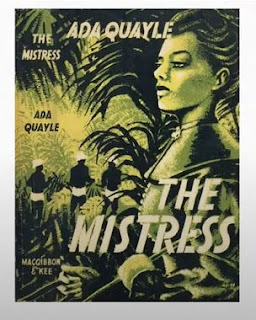A woman in charge – three books set between 1860s and 1915
WORKING DRAFT
A woman in charge – three books set between 1860s and 1915

Thanks to the Ed Baugh Lecture held on May 9, 2022 I first heard about what could be considered as the first novel by a Jamaican woman. A notable fact, but I read the novel a few days later and it is remarkable that it is set in 1915-1917 about a Jamaican woman and her banana estate. The author, I think, gives us the world as it would have been seen by a contemporary observer and it led me to think about two other books with women in charge: Far From the Madding Crowd (FFTMC) by Thomas Hardy and Gone With the Wind (GWTW) by Margaret Mitchell.
The lecture was delivered by Head of School of Literature, Drama and Creative Writing, Professor Alison Donnell’s theme was: The Missing Mid-Century West Indian Woman Writer and Another Quarrel With History. She addressed three writers, Ada Quayle, Jamaican and author of one novel, The Mistress (1957); Edwina Melville, Guyana, journalist and short story writer; and Monica Skeete, Barbados, novelist and short story writer.
The protagonists of the three books that came to my mind: FFTMC, GWTW, and The Mistress have the following similarities. They are teenagers when they came into control of their lives and also control of agricultural estates and of people who work the land: I considered these young women on two points: their stewardship of the land and their lovers.
In FFTMC, following the death of her uncle in the 1860s, Englishwoman Bathsheba Everdene, at about age 18 or 20, and without any agricultural or managerial experience, decides to personally manage her inheritance, which is the sheep and grain farm, Weatherbury.
Everdine makes it a point to consider Weatherbury as her means to personal independence, and she admirably makes the proper running of the farm, her priority. As Hardy allows her to say to the workforce, “I shall be up before you are awake; I shall be afield before you are up; and I shall have breakfasted before you are afield. In short, I shall astonish you all.”
The book turns its attention to setting her relationships with men as their equal, with the rigours of farm life as the backdrop to demonstrate her determination.
In the novel GWTW, upheaval caused by the American Civil War in the late 1860s led the nineteen-year-old, twice widowed, currently married Scarlett O’Hara to assume the running of her family’s ruined cotton plantation Tara, after her father lost the resolve to carry on. Unlike the other protagonists, O'Hara is also a mother to one child.
As a plantation manager and matriarch, O'Hara lives in the ruins of the estate and displays a determination that no deprivation is too much for her to overcome. She rages while watching her cotton harvest burn, at the hands of the invading army, “As God is my witness they're not going to lick me. I'm going to live through this and when it's all over, I'll never be hungry again. No, nor any of my folk. If I have to lie, steal, cheat or kill. As God is my witness, I'll never be hungry again”.
In Quayle's The Mistress, in 1916, sixteen-year-old Jamaican Laura Pettigrew unexpectedly inherits the banana plantation Newbiggin, after her mother dies as the result of an accidental overdose of an Obeah spell set on her by her coachman. She is determined to make a success of the plantation.
Not written in the high literary style of Hardy, Quayle's writing vividly evokes the period, and demonstrates Laura’s determination to make her farm productive. The possible reason why this book has remained in obscurity is that her strength of character is many times accompanied by the unvarnished brutality that she, as mistress, delivered to her workers. This renders Laura ignoble while Bathsheba and Scarlett are heroines.
The language of The Mistress is notable from FFTMC and GWTW as Laura speaks the same Jamaican language as her workers. There is no distinguishing great house language from village language, they are one. The Pettigrews and their workers worship in the kirk on Newbiggin. In addition to attending church though, the workers also have their own religious ceremonies and also have a role for the obeahman at times.
Unlike Laura Pettigrew, the spoken English of Hardy's Everdine is different from her workers on Weatherbury. It is indeed Everdine's spoken language and customs that cause her to separate herself from suitors to find a husband who satisfies her cultural tastes.
O'Hara's spoken English is also different from that of the enslaved persons on Tara, but there is complete understanding between them.
Each of these three landowning women consider themselves free to choose a suitor or a lover. In the opening pages of The Mistress, Pettigrew has taken her neighbour Neil Naunton as her lover. Naunton lets her down financially and also delivers an emotional blow when he takes on her neighbour as his fiancée. Laura has convinced herself that she will devote herself only to him until she has to choose between the success of Newbiggin and the attention of Naunton.
Everdine allows herself to fall in love with Sergeant Troy who she marries and who brings her towards financial ruin and also impregnates her worker. She clung to the idea of him as her ideal man for a long time.
O'Hara, on the other hand, had more complex emotional outings. She loved the mild-mannered Ashley Wilkes whom she could not have, and after he died, she became attracted and connected to the opposite kind of man, Rhett Butler, with a domineering character.
One question to me was how much did The Mistress borrow from GWTW. I think nothing at all. The character of Laura was immensely Jamaican in speech and mannerisms. The author also had good knowledge of the land and farming in Jamaica and this came out in her descriptions. The tension between expatriate workers, peasants, black overseer, white pastor, coloured wealthy relative and the sexual determination of women of every colour seems to be island based. Also, in FFTMC and GWTW the lead women travelled in carriages, while Laura was an excellent horse rider, the novel gives us many examples of escapades on horseback.
The poem on which FFTMC gets its name, "Elegy Written in a Country Churchyard" is apt for the stories around Bathsheba, Scarlett and Laura Pettigrew. The poem pays tribute to countryfolk whose hearts and passions were probably as grand as any leader of nations or grand artists or philosophers.
As it says in the 8th and 9th stanzas:
“Let not Ambition mock their useful toil,
Their homely joys, and destiny obscure;
Nor Grandeur hear with a disdainful smile
The short and simple annals of the poor.
The boast of heraldry, the pomp of pow'r,
And all that beauty, all that wealth e'er gave,
Awaits alike th' inevitable hour.
The paths of glory lead but to the grave.”
But, these thoughts started because of the 2022 Ed Baugh Lecture, so to him I must give the privilege to wrap these characters together, and his poem Elemental allows me to do so. It is a poem of carrying on through unknown perils and to rejoice at the end for bravery to have made the journey.
"I would have words as tenacious as mules
to bear us, sure-footeed
up the mountain of night
to where, at daybreak;
we would shake hands with the sun
and breathe the breezes of the farthest ocean
and, as we descended,
in sunlight,
We would be amazed
to see what hazards we had passed."
END



